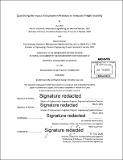Quantifying the impact of deployment practices on interplant freight volatility
Author(s)
Ma, Kurn; Kumar, Manish
DownloadFull printable version (7.006Mb)
Other Contributors
Massachusetts Institute of Technology. Engineering Systems Division.
Advisor
Roberto Perez-Franco.
Terms of use
Metadata
Show full item recordAbstract
As the US economy recovers from the recession of 2008, demand for freight transportation is getting stronger. However, the trucking industry is not ready to take on this growth in volume due to a shortage of truck drivers. From a shipper's perspective, availability of transportation is an important concern that needs to be addressed to ensure customer satisfaction, realize growth and keep costs down. Shippers can enhance their carriers' ability to provide consistent trucking capacity by reducing the variability of freight demand. This thesis creates a simulation model of deployment processes at a consumer packaged goods company to evaluate relationship between transportation variability and various management levers. Through the analysis of the simulation runs, the effects of management levers on the freight volatility are quantified. The findings of the research show that actively limiting the truckloads sent downstream, and thus eliminating the freight volatility through internal policies is a potential solution. The thesis concludes by presenting the benefits and trade-offs of this approach on the logistics costs of the sponsor company. If the company sticks to the current policy of immediate shipment as the need arises, the thesis shows that the best deployment schedule is a bi-weekly one.
Description
Thesis: M. Eng. in Logistics, Massachusetts Institute of Technology, Engineering Systems Division, 2015. Cataloged from PDF version of thesis. Includes bibliographical references (pages 45-46).
Date issued
2015Department
Massachusetts Institute of Technology. Engineering Systems DivisionPublisher
Massachusetts Institute of Technology
Keywords
Engineering Systems Division.